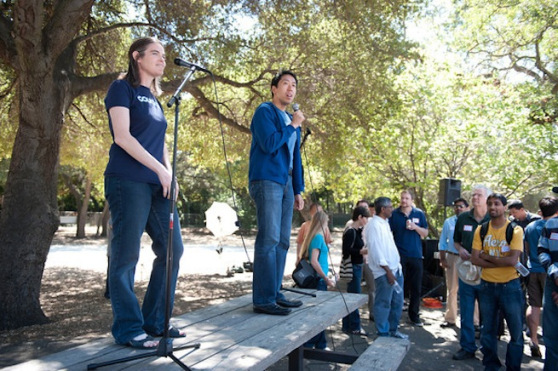Coursera just announced a partnership with some of the largest state universities in a bid to bring online education to millions of students.
[aditude-amp id="flyingcarpet" targeting='{"env":"staging","page_type":"article","post_id":747212,"post_type":"story","post_chan":"none","tags":null,"ai":false,"category":"none","all_categories":"business,","session":"C"}']The online education provider has teamed up with 10 state university systems and public university flagships, including the State University of New York (SUNY), and the University of Colorado system. It’s a huge undertaking — SUNY alone currently enrolls over 460,000 students.
“Colleges are experimenting with different models state-by-state, but one thing is clear — the world is moving toward blended learning,” said Andrew Ng, Coursera’s cofounder [pictured above], in an interview with VentureBeat. Blended learning refers to the practice of students learning at least in part through the online delivery of content.
AI Weekly
The must-read newsletter for AI and Big Data industry written by Khari Johnson, Kyle Wiggers, and Seth Colaner.
Included with VentureBeat Insider and VentureBeat VIP memberships.
“Many of our new partners will adopt content from a different campus to serve online content to their students,” he added.
The partnership with Coursera is intended to augment the universities’ existing database of online courses. “This new partnership with Coursera will be invaluable as we launch Open SUNY, which will give our students increased access to the online courses SUNY faculty offer in New York and worldwide,” said Nancy L. Zimpher, chancellor of the nation’s largest system of public higher education at SUNY in a statement.
The state colleges signed up will also have the opportunity to add content to Coursera (open to anyone with an Internet connection), and can collaborate with existing educational partners. Elite universities already signed up include Yale University and Northwestern, as well as a handful of international schools.
Educators and policy-makers increasingly view providers of massive open online education — dubbed “MOOCs” — as the solution to the current crisis. Although skeptics say they are just the beginning.
Ng claims to have “informal support” from state governments. In recent months, Ng and his cofounder, Daphne Koller, offered advice on a bill that was proposed in California to force state universities to accept certain online courses for credit. The landmark legislation may improve student matriculation rates in California. Students are struggling to graduate on time (if at all) since required courses, like Algebra I, are often oversubscribed.
Another benefit to MOOCs is that professors are theoretically freed up to teach more in-depth topics, or offer one-on-one instruction.
[aditude-amp id="medium1" targeting='{"env":"staging","page_type":"article","post_id":747212,"post_type":"story","post_chan":"none","tags":null,"ai":false,"category":"none","all_categories":"business,","session":"C"}']
Ng believes that high school students will benefit. Seniors can take college-level courses on their laptops at home, and then transfer the credits. But he admits that this is a long-term goal, as it will take a few years before state universities are ready to accept online courses as credit.
Coursera competitor Udacity recently took a more extreme approach in offering an entirely online masters degree through a partnership with Georgia Tech. The benefit is that students can access education for a fraction of the price. It’s not yet clear whether a partnership with Coursera will drive down tuition prices — although that’s certainly a long-term goal.
The full list of state partners include SUNY, University of Colorado System, Tennessee Board of Regents and University of Tennessee Systems, University of Houston System, University of Kentucky, University of Nebraska, University of New Mexico, University System of Georgia, and West Virginia University.
VentureBeat's mission is to be a digital town square for technical decision-makers to gain knowledge about transformative enterprise technology and transact. Learn More

